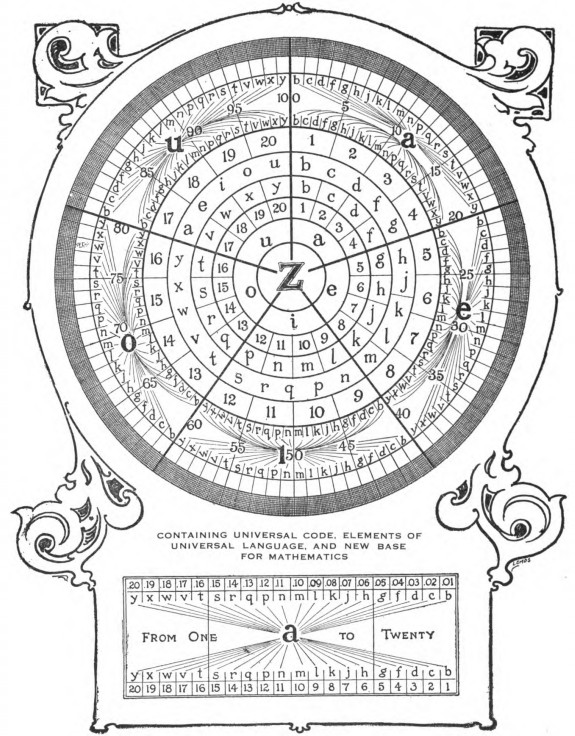
Nathan Bailey’s Universal Etymological Dictionary of 1764 defines thunder as “a noise known by persons not deaf.”

Nathan Bailey’s Universal Etymological Dictionary of 1764 defines thunder as “a noise known by persons not deaf.”
In the 11th century, sailors in the Mediterranean developed a pidgin language to communicate with one another, a mix of Italian, Spanish, Catalan, Galician, Portuguese, Occitan, French, Latin, English, and other languages in which they could conduct trade and diplomacy. Known as Sabir, it appears briefly in Molière’s comedy Le Bourgeois gentilhomme when the Mufti sings:
Se ti sabir
Ti respondir
Se non sabir
Tazir, tazir
Mi star Mufti:
Ti qui star ti?
Non intendir:
Tazir, tazir.
This means:
If you know
You answer
If you do not know
Be silent, be silent
I am Mufti
Who are you?
If you do not understand,
Be silent, be silent
The language persisted into the 19th century, and traces of it can still be found in modern slang and in geographical names.
cimicine
adj. smelling of insects
hircinous
adj. smelling like a goat
suaveolent
adj. smelling sweet
alliaceous
adj. smelling like garlic or onions
puant
adj. stinking
macrosmatic
adj. having a well-developed sense of smell


Dr. Dobbin, lecturing on physical education in Hull, England, condemned the practice of tight-lacing as injurious to the health and symmetry of the female sex, and jocularly proposed the formation of an ‘Anti-killing-young-women-by-a-lingering-death Society.’
This was gravely reproduced in other parts of England and on the Continent as a sober matter of fact, the Germans giving the hyphenated title thus: Jungefrauenzimmerdurchschwindsuchttodtungsgegenverein.
— Charles Carroll Bombaugh, The Book of Blunders, 1871
The 12th edition of The Chambers Dictionary, published in 2011, highlighted about 500 words that the editors considered especially entertaining. For the 13th edition, in 2014, they chose to remove the highlighting but inadvertently removed the entries entirely.
The missing entries have since been reinstated, but in the interval the publishers supplied a list of the missing words. Here it is.
(Thanks, Chris.)

hippomachy
n. a fight on horseback

With The Scientific Dial Primer (1912), Andrew Hallner aimed to make a universal phrasebook for all mankind. The dial contains five rings, and code words can be constructed by working from the center outward. For example, the first ring contains 5 vowels and the second 20 consonants; these can be combined to create 100 two-letter words that are used to represent the numbers 1-100 (ti, for example, means 56). Adding the third ring yields 2,525 one-syllable three-letter words, which are given specific meanings (jad refers to a butcher knife, dag to cement in sacks). With some refinements, the system can encode a message as specific as this:
We shall discard all Sunday newspapers, for these are the chief sinners and temptors, being themselves Sabbath-breakers, and maintain but one or two dailies. But these you need not look at, for I will read to you such articles and extracts as relate to Congress and general intelligence, profitable and elevating to know about.
This assertion would be represented everywhere by the same code, qema; speakers of different languages would only need local phrasebooks that explain this meaning to each in his own tongue.
“By writing or pointing to the Scientific Dial Code-Word, therefore, you can communicate intelligently with any nationality on our globe,” Hallner wrote. “You can travel in or through any country, find the way, buy tickets, give orders in hotels and restaurants, attend to toilet, address the barber, arrange your baths, and do anything and everything necessary in travel; and in ordering goods, in exchanging money, and in carrying on general business transactions. And all this knowledge may be acquired in a week! For to acquire and make use of this knowledge is only to understand the Scientific Dial and the principles involved.”
In “Freaks of the Telegraph,” an 1881 article in Blackwood’s Magazine, Charles Lewes points out that in Morse code the words BAD (-… .- -..) and DEAD (-.. . .- -..) differ only by the space between the D and E in DEAD.
This could result in a sentence such as MOTHER WAS BAD BUT NOW RECOVERED being interpreted strangely as MOTHER WAS DEAD BUT NOW RECOVERED. “Of course, in this case a telegraph operator (short of believing in zombies) would likely notice something was amiss and ask for confirmation of the message — or else attempt to correct it himself,” writes N. Katherine Hayles in How We Think.
But correcting it himself could lead to further misunderstandings. Lewes gives one example: “A lady, some short time since, telegraphed, ‘Send them both thanks,’ by which she meant, ‘Thank you; send them both’ — (the ‘both’ referred to two servants). The telegram reached its destination as ‘Send them both back,’ thus making sense as the official mind would understand it, but a complete perversion of the meaning of the writer.”
In 1860 Manchester layman J. Gill wrote “a sermon in words of one syllable only”:
He who wrote the Psalm in which our text is found, had great cause to both bless and praise God; for he had been brought from a low state to be a great king in a great land; had been made wise to rule the land in the fear and truth of God; and all his foes were, at the time he wrote, at peace with him. Though he had been poor, he was now rich in this world’s goods; though his youth had been spent in the care of sheep, he now wore a crown; and though it had been his lot for a long time to hear the din of war and strife, peace now dwelt round the throne, and the land had rest.
The whole thing is here. “This Sermon … is offered to the public with the view of showing that at least big words are not necessary for the conveyance of great truths to the minds of the people,” he wrote in a preface. “[I have] an ambition to prove that, in the advocacy of religious truth, very plain, simple, and old-fashioned words have not yet lost their original force and significance.”